Photo
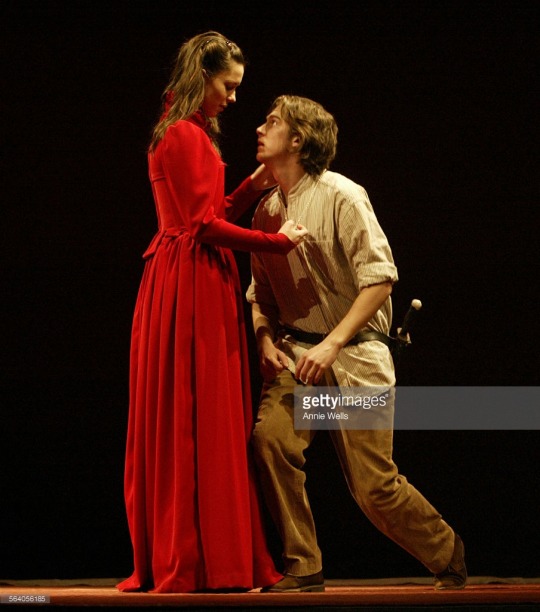
Rehearsal of Sir Peter Hall’ s staging of Shakespeare’ s gender bending romantic comedy, As You Like It. Hall’ s daughter Rebecca Hall plays the runaway Rosalind, who in this photo is giving Orlando, played by Dan Stevens, her necklace. [UK 2004/ Brooklyn Jan 2005]
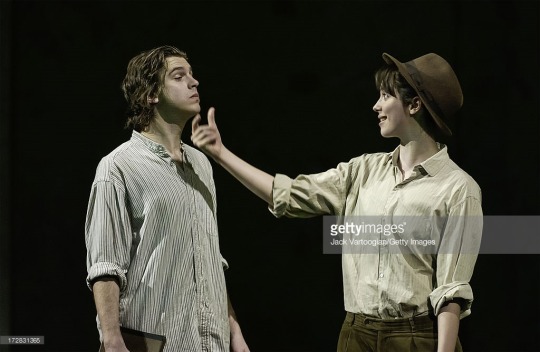
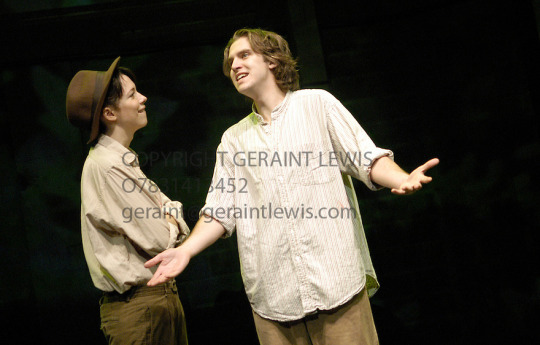
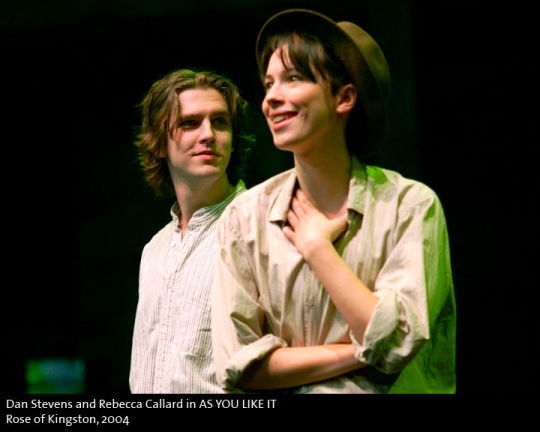
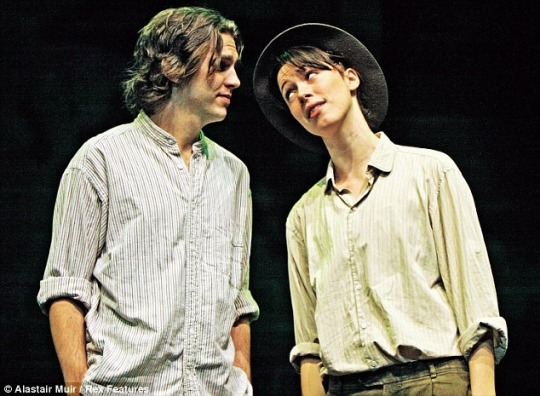
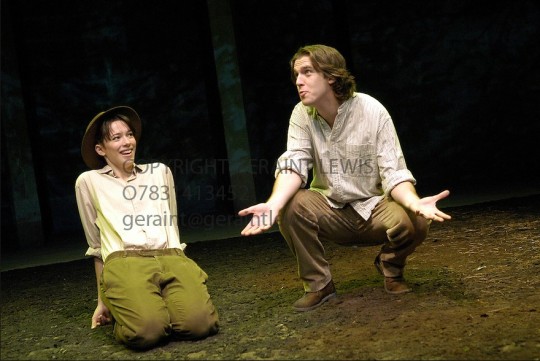
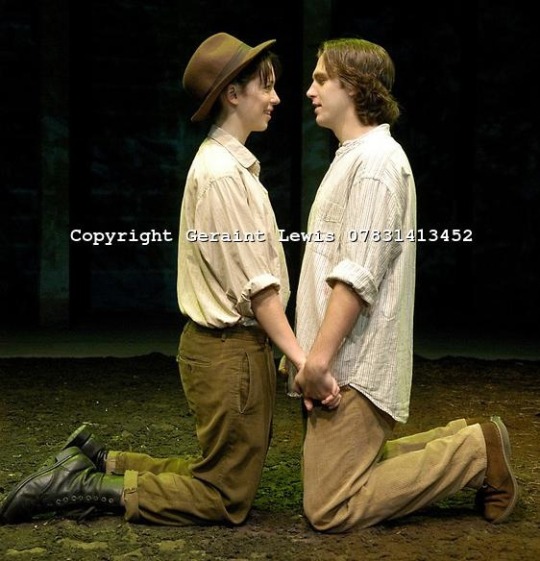
137 notes
·
View notes
Text
W7
Your final writing dossier prompt will be to formulate a coherent response to the play. You will have a week to gather your thoughts, synthesize the many ideas and arguments you've encountered, and explore your critical approach to the play. The final writing prompt should mirror the structure and tone of the Murray and Dickson responses (less formal than an essay, more formal than a conversational tone -- with an emphasis on a critical approach rather than a personal reflection)
Although Shakespeare may not have known about queer theory during his time of writing As You Like It, certainly the most compelling perspective and argument one can make about the play is that there are many many hints at homosexuality being present during the course of As You Like It. It prevails as a cenrtral theme in character names, character identities, and different scenes of the text that we encounter as readers.
For an instance – as a reader, when you first learn that Celia, Rosalind’s cousin who could have just as easily remained with her father, now the ruler of a land, instead chooses to go with her beloved cousin Rosalind who she prefers above all, you are immediately tempted to point that Celia and Rosalind are much closer than other women in Shakespeare’s texts have been. Famed Hero and Beatrice of Much Ado About Nothing, although equally as close, were sisters and had a bond that was explainably very close, but still nowhere near as dedicated as Celia is to Rosalind, who is her cousin and also the daughter of the man who had rule over the kingdom before her father. The delicate fold of their relationship is mirrored in the language that Celia and Rosalind speak in, which is more like lovers than siblings or friends, something that is a theme throughout the play. The closeness of their relationship shows that there is some hint of queer theory despite the fact that Rosalind’s goal throughout the play is to win over Orlando, who she greatly likes. This is very much out of the norm at the time, and rejects all positions of sexuality norms of the time too.
The next most obvious hint is at the name Ganymede, who in Greek mythology was a mortal boy that Zeus fell in love with. The fact that Rosalind chooses the name Ganymede as her male disguises name speaks colours about her rejection of traditional gender roles, and about the potential relationship she could have with Orlando, who is unaware she is in disguise during much of her interaction with him. Ganymede is the one who instructs Orlando on how to prove his love to Rosalind – and in doing so also creates a space where Orlando is much closer to Ganymede than he ever is to Rosalind, who is ultimately distanced from this. Rosalind parading around as Ganymede is a wonderful way of introducing how unusual and difficult to place a relationship between two men, one of whom is really a woman, really is. It almost mirrors the situation in Greek Myth where Zeus is in love with Ganymede, a boy.
Another scene of great interest, as mentioned by Dickson in his article, is the final scene where Silvius, Phoebe, Orlando, and Ganymede are standing together and Ganymede is making his vows to the three. Not only is Orlando possibly looking away from everyone, but Ganymede’s startling reaction to Orlando’s words shows that there is a chance that she was afraid Orlando had caught wind of her secret. If indeed, he did find out, or had some semblance of suspicion, he still continued to treat Ganymede as a man and Rosalind as an entirely separated entity. The play doubles on the confusion in genders and appearances when after her marriage, Rosalind invites herself back on stage, and reveals that she would kiss the men in the crowd were she really a woman – another hint that a boy is playing Rosalind who is playing Ganymede. This doubling of disguises and breaking the social norms surrounding what a man is and what he must dress like is astounding, and shows that queer theory is at great effect in the play, likely when it was being performed. It once again makes a fitting reference to the character Ganymede in Greek Mythology, who Zeus had fallen in love with – a boy, who a man fell in love wit. Essentially, Rosalind, being played by a boy, was a boy who the theatres men would have fallen in love with.
This remarkable parallel where queer theory manifests itself in so many different ways around Rosalind and her relationships during the course of As You Like It is a fantastic way to explore how it relates to the people of that time and the very deliberate way that Shakespeare attempted to convey changes in social norms and structure.
0 notes
Conversation
Characters in As You Like It and the kind of blogs they would have
Orlando: A poetry blog but the poetry is all terrible. He's the kind of guy that adds unnecessary comments instead of writing commentary in the tags.
Rosalind: Nerd stuff, aesthetic stuff, a sprinkling of social justice and politics. Begrudging reblogs of Orlando's posts.
Celia: Pictures of Cate Blanchett and Kristen Stewart. Music. Makes fun of Orlando's poetry.
Oliver: Lots of politics and vague blogging about Celia.
Jaques: Nothing but shitposting
Touchstone: Porn.
Phebe: Aesthetic blogging. Pictures of her Starbucks against the sunset. BASIC.
Silvius: Reblogs everything Phebe posts. Also picture of sailboats and terrible shirtless selfies. A dudebro.
Audrey: Also an aesthetic blogger, but it's more pictures of her trip to Bonaroo. 420 friendly.
Adam: Pictures of the DeBoys boys
Corin: Pictures of sheep
150 notes
·
View notes
Quote
O, how bitter a thing it is to look into happiness through another man's eyes!
Orlando (As You Like It, Act V scene ii)
402 notes
·
View notes
Photo
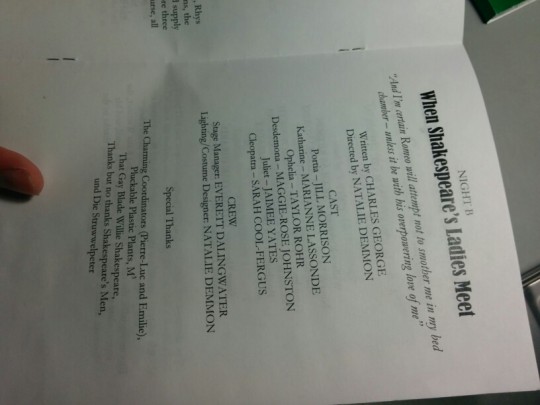
REVIEW: When Shakespeare’s Ladies Meet
@Theatre Activ @Bishops University
When I went to watch Theatre Activ’s Night B performance, the most exciting part of the session was the last drama they enacted, a situation involving some of Shakespeare’s ladies meeting. Although many of the ladies represented in the play are popular ones, others are not. And it was hard for some students beside me to distinguish them, especially students who don’t have experience with Shakesepare. Recognising Katherine, who may not be the most popular comedy heroine that Shakespeare presents. Beatrice could have just as easily filled the role and been a bit more popular because Kenneth Branagh did a version of Much Ado About Nothing that garndered attention.
Another thing about Katherine that could have been introduced was her actual snarky, yet very intelligent manner presented in Taming Of The Shrew. She was a woman who didn’t want to marry. Having her too subdued to Petruchio was a bit of a let down, considering what we did know of her character.
The play really touched on the painful aspects of each of these female heroines and their lives. I loved the inclusion of Ophelia, who shows up dazed. I loved how Portia was the most collected. And I also loved how everyone criticized each other. Cleopatra, who emerged towards the end, had a wonderful place as the most wily of the women there. And Juliet’s overall naivety to her own situation was very true to her character, although they could have made her a little more innocent as she is portrayed in Romeo and Juliet.
Overall, this was a fantastic introduction to Shakespeare’s ladies. It gives a taste of what each woman is like, what she has done, and what to expect of her leading man. It’s a good way to make people interested in reading these plays, something that a lot of students might not do immediately anyway.
0 notes
Text
W6
Read the Dickson article and respond to it. Do you agree? Disagree? What is most interesting? confusing? perturbing? enlightening?
Although I found the entire article intriguing, the language and the jumpiness made it confusing. I generally understood what Dickson was arguing, but could not make sense of it. It was difficult to understand what he wanted his students to do in the present, and it was only helped by the explanation later on. This sort of situation that he describes where the multiplicity of Rosalind and her actor is something we also discussed in class, but it generally seems to confuse me when written in paper.
Dickson’s argument seemed mostly sound to me. That the impossibility of Rosalind’s actor running back and forth between Orlando, Silvius, and Phoebe is higlighted through this article, hints towards what Shakespeare might intend to show as the difficulty of maintaining such a huge facade. I liked the addition about Orlando possibly having figured out her disguise or started to notice it because of the choice of working Shakespeare makes, but it is still conjecture. Although I agree with his argument, I found it confusing. I feel there could have been better ways to illustrate his point to his readers, some of whom might not be used to his language.
0 notes
Text
W5
How is Shakespeare's play giving us lessons on how to respond to literature? Is there a difference between poetry and plays in terms of how we learn?
In 3.2 we see Rosalind initially disliking Orlando’s poetry, because it really isn’t well written or reflective of anything. When Rosalind learns it is Orlando, her perspective changes and she asks questions about him, as a person, sohwing that we can change our perspective on a piece of poetry based on the background of the writer. We wouldn’t read a Romantic Poet the same way we would a Victorian one, they have entirely different styles and depending on the writer, our perspectives changed.
Rosalind’s brief interaction with Orlando following this was a distinguishable change in which she tried to teach him proper poetry, and critisized his writing to show him what the right way to describe someone is. When we read his poetry, it’s all very messy and difficult to pronounce, something that shows he isn’t educated and that he is saying the poetry just so he can express how amazing love itself is.
I think Shakespeare is trying to say that once a piece of work is published, it will be criticized by several other people, and feedback both negative and positive will emerge. Adapting your writing, growing in it, and trying to fit the times and surroundings is an important part of writing.
Based on this reading, it’s important to notice that plays teach us in a very direct method, but poetry requires close reading.
0 notes
Photo

FAVORITE SHAKESPEAREAN LADIES: Rosalind (As You Like It)
Were it not better, because that I am more than common tall, that I did suit me all points like a man?
58 notes
·
View notes
Conversation
As You Like It (III. 2. 256 - 260)
Jaques: Rosalind is your love's name?
Orlando: Yes, just.
Jaques: I do not like her name.
Orlando: There was no thought of pleasing you when she was christened.
108 notes
·
View notes
Photo
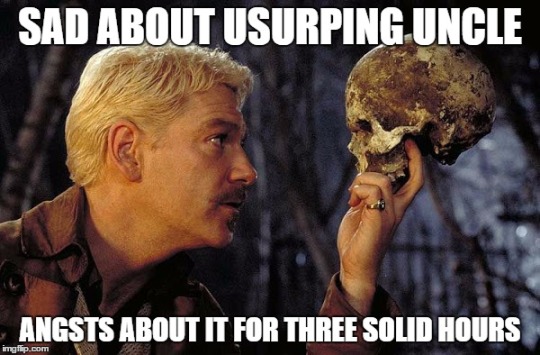
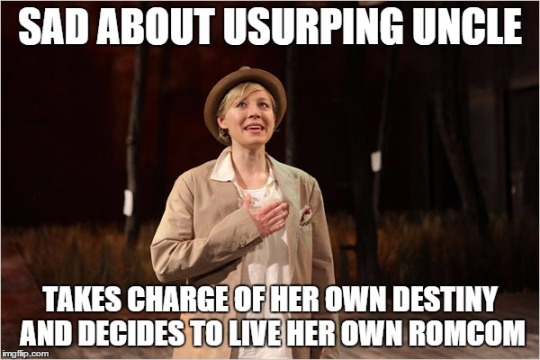
In which Rosalind is at least 800 times better than Hamlet.
182 notes
·
View notes
Photo
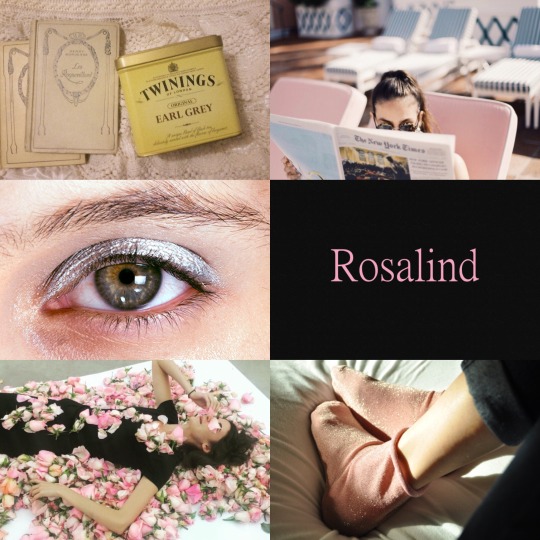

Modern Shakespearian Women
Rosalind ~ As You Like It by William Shakespeare
148 notes
·
View notes
Photo
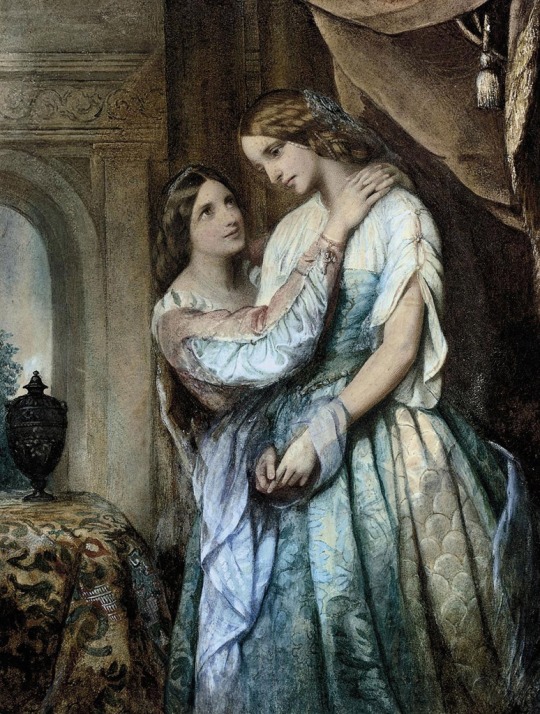
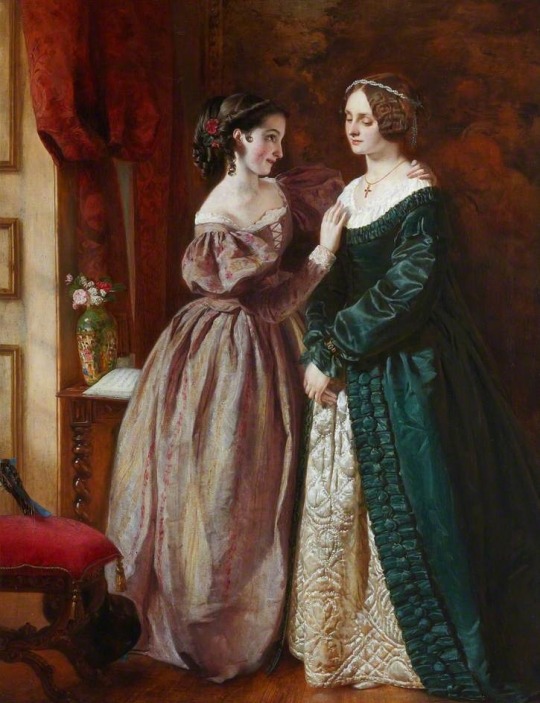
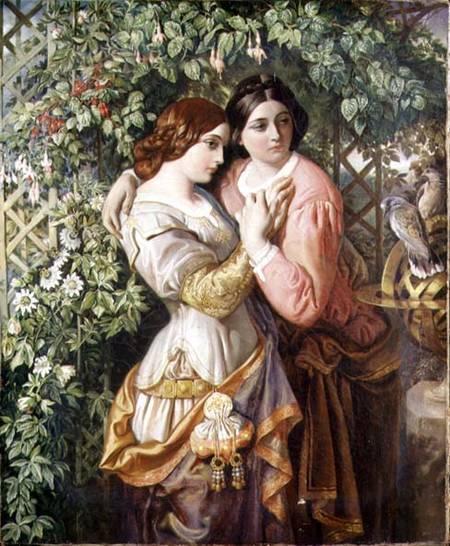
Three paintings of Rosalind and Celia from As You Like It. They’re cousins, but in the play, Celia’s love for Rosalind is described as, “dearer than the natural bond of sisters”. Celia, you gay you so gay Image 1: by Margaret Gillies, 1857. Image 2: by James Archer, c.1854-1858 Image 3: by Daniel Maclise c. 1845
1K notes
·
View notes
Photo


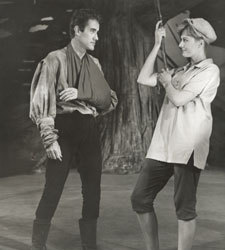
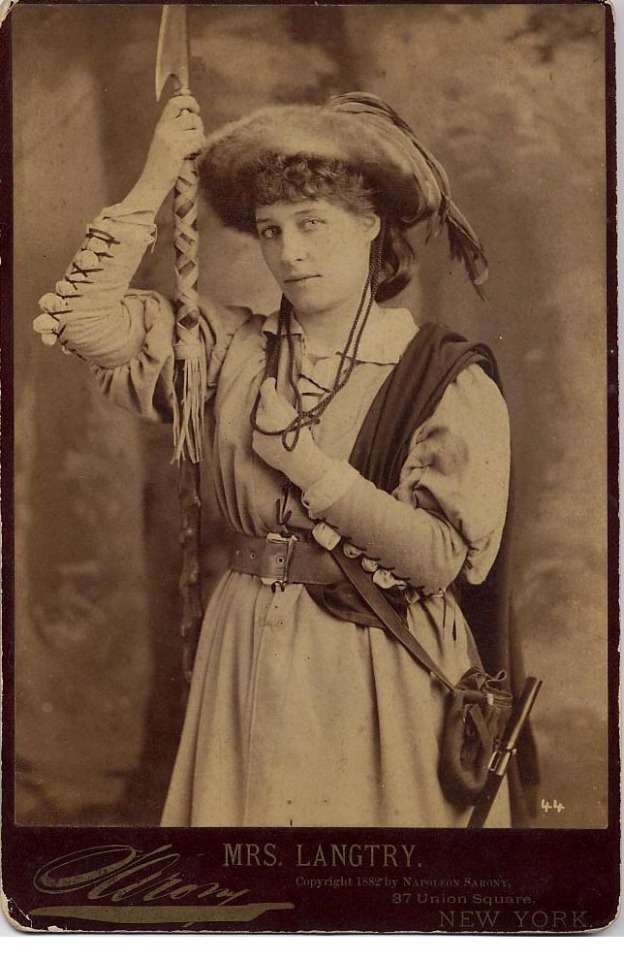
Examples of costumes of Rosalind as “Ganymede”
1 note
·
View note
Text
W4
How is IDENTITY performative (Judith Butler)?
When I look at identity, I think of a study we read about in a psychology course that centered around a baby and how the nurses first dressed it in pink, and everyone thought the baby was a girl. Later, they dressed the baby in blue, and when other people came in, they thought it was a boy and associated it with manly descriptions like how tough the baby’s jaw looks. This goes to show that we as people view identity through our socio-cultural context. What makes up identity changes based on our performance. If I came to class one day dressed in black, with my hair over my face, black eyeliner, and lip piercings, my performative identity would change drastically.
As per how Judith Butler described it, and how Shakespeare’s Metatheatrical components of As You Like It also described it, performance in daily life almost seems normal. We have so many different functions as people, there is no real way to avoid it. Changing how life may be performative doesn’t seem like something necessary. Having the same static role in life, like being a housewife 100% of the time, would be much worse, and maintaining several different performative identities successfully is a much larger challenge. Your identity should be changing and fluid.
I don’t think knowing we are involved in performative identities really liberates us. We still have to perform those identities. Instead, it makes us aware of it and how it influences others. It’s a good way of seeing how life works, how intricate your identity really is, and what infleunces it.
0 notes
Text
W3
How would you stage As You Like It?
If I were to do a staging of As You Like It, I might try to appeal more to a contemporary audience, however, keeping in mind that at this point, seeing a crossdressing woman isn’t something entirely new. We have had Mulan, a Disney film, where Fa Mulan crossdresses as Ping to save her father’s honour. We have had Pirates of the Carribean where Elizabeth Swann who portrays a woman pirate, almost in the same sense venturing into points of masculinity in order to gain the man of her dreams. A lot of these women have built on themes that As You Like It may have very well introduced!
I would change the location a little to have it take place in the 20′s maybe. The idea of the focus being a larger gang territory in the United States, that Duke Frederick usurps from his brother Duke Senior. Senior, forced to flee from this place, goes to a pastoral heaven with his daughter and her cousin, and they take up life there. From here, we can use scenes of the play that maintain how Oliver falls in love with Rosalind, have Rosalind dress as Ganymede, but perhaps add in the additional backdrop of the roaring 20′s, where the focus is on how Rosalind, as a woman, decides her best prospect is marrying Orlando. I would not include the lengthy poetry scene, or at best, cut it down into a song about Rosalind, who could then say Orlando can’t sing.
I would end the play with Duke Frederick, instead of a religious conversion, the Wall Street crash makes him realse that the Roaring 20′s are over, and he doesn’t know how to maintain his empire. He rushes back to Duke Senior by the end of the play, asks for forgiveness, and tells his brother to take control of their gang back. Duke Senior is mob boss again, everyone is married.
I’m not too sure about the casting, since there are a ton of people who could fit the roles, but based on actors who could do the parts, I can say I’d pick the following caste.
Orlando Bloom as Orlando (because of his portrayal of Paris in Troy, he can be the pretty boy character, but he also can portray intelligent characters like Legolas and Will Turner, who are street smart rather than intelligent).
Kenneth Branagh as Duke Senior or Silvius, if he had been younger (Kenneth Branagh did really well as Benedick in Much Ado About Nothing, and I could see him fit Silvius as a role).
Probably Anna Kendrick for Rosalind because she’s a strong female actress, or if going in a more ethnicity inclusive way that most films nowadays are going, Kat Graham as Rosalind would be perfect because she’s a really strong female actress and really redefines what it means for a female to be strongest.
I’m not so sure about the other roles, but I’d probably have a blonde, more timid appearing female for Celia, to make her seem less eminent than Rosalind.
Overall, I feel like the casting should reflect the times. And if it’s in the Roaring 20′s, I think of Gatsby parties and cabaret, so the overall modd might not be so pastoral, but the change would make it more relatable to people and add a new flare of life to the story while maintaining its important bits.
0 notes
Conversation
Orlando: Man, I just…. I’m not really good at talking to girls.
Rosalind/Ganymede: Why? You’re hot!
Orlando: ...
Rosalind/Ganymede: what
Orlando: ...
Rosalind/Ganymede: You’re an appealing guy... man... guy... guy-man
497 notes
·
View notes
Quote
C'mon, let’s Mulan this shit.
Rosalind, to Celia, As You Like It. (via drunken-shakespeare)
419 notes
·
View notes